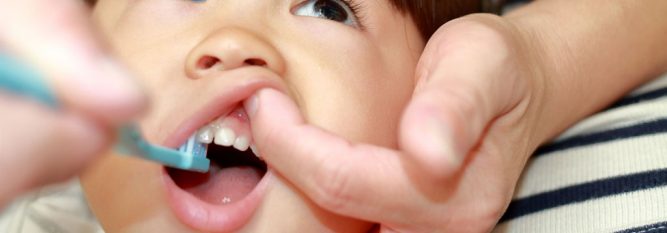Realistically, it is difficult for parents to tell whether a toddler has tooth decay. In fact, by the time they come in and say, “I think my child has tooth decay because I can see something,” it’s often already too late. With that in mind, I’ve come up with some tips for avoiding toddler dental decay.
Don’t underestimate diet
Diet is a huge factor when it comes to the increase in dental decay in children. Sadly, we’re exposed to so much sugar these days—my kids are going to birthday parties and getting the quantity of sugar in party bags that they should be ingesting over a period of six to 12 months!
It goes without saying—but limit the amount of sugar in your children’s diets and watch what they eat when they go out. Keep an eye out too for hidden sugars in foods, like in tomato sauce—sugar is creeping in everywhere.
Keep an eye on how they clean their teeth
If diet is not an issue, sometimes dental hygiene can be an issue when it comes to caries in kids. It might seem over the top, but I urge parents to supervise and brush for their children at least some of the week until they reach the age of about seven or eight. I understand that parents want their children to become a little bit more independent from a young age, and as part of this encourage them to brush on their own, but with kids being kids, it’s often not the most rigorous clean, which inevitably leads to problems.
The way we tackle this issue in our family is that I’ve picked two days during the week to brush my daughter’s teeth, and she’s nearly seven. Then, for say another two or three days of the week, I’ll watch her technique to make sure that she is brushing properly. For the balance of the week, she brushes her teeth on her own. This strategy works perfectly because by the time a child reaches the age of seven, they can usually pull off a really good brushing, and a parent brushing a child’s teeth those extra two days in a week is usually sufficient to prevent cavities from forming, provided that the technique is good. I encourage my parent patients to try this strategy at home or to adapt the method—obviously, you need to do what is workable within your own family unit.
Don’t feel like you have to do a perfect brush every day—that’s not what we’re after—and it’s still incredibly important to allow the children to learn how to brush their own teeth effectively (usually, by you demonstrating how to do it).
Use the appropriate toothbrush for the age group
Sometimes, it’s recommended that parents use a cloth to brush an infant’s teeth. My view is that you should start using a soft toothbrush on a baby’s first teeth, which is usually from around the age of six months. You don’t need to use toothpaste at that age—wait to introduce toothpaste until a child learns to speak, and when you can be sure that a child understands not to swallow it, which could be anywhere from between two to three years of age.



